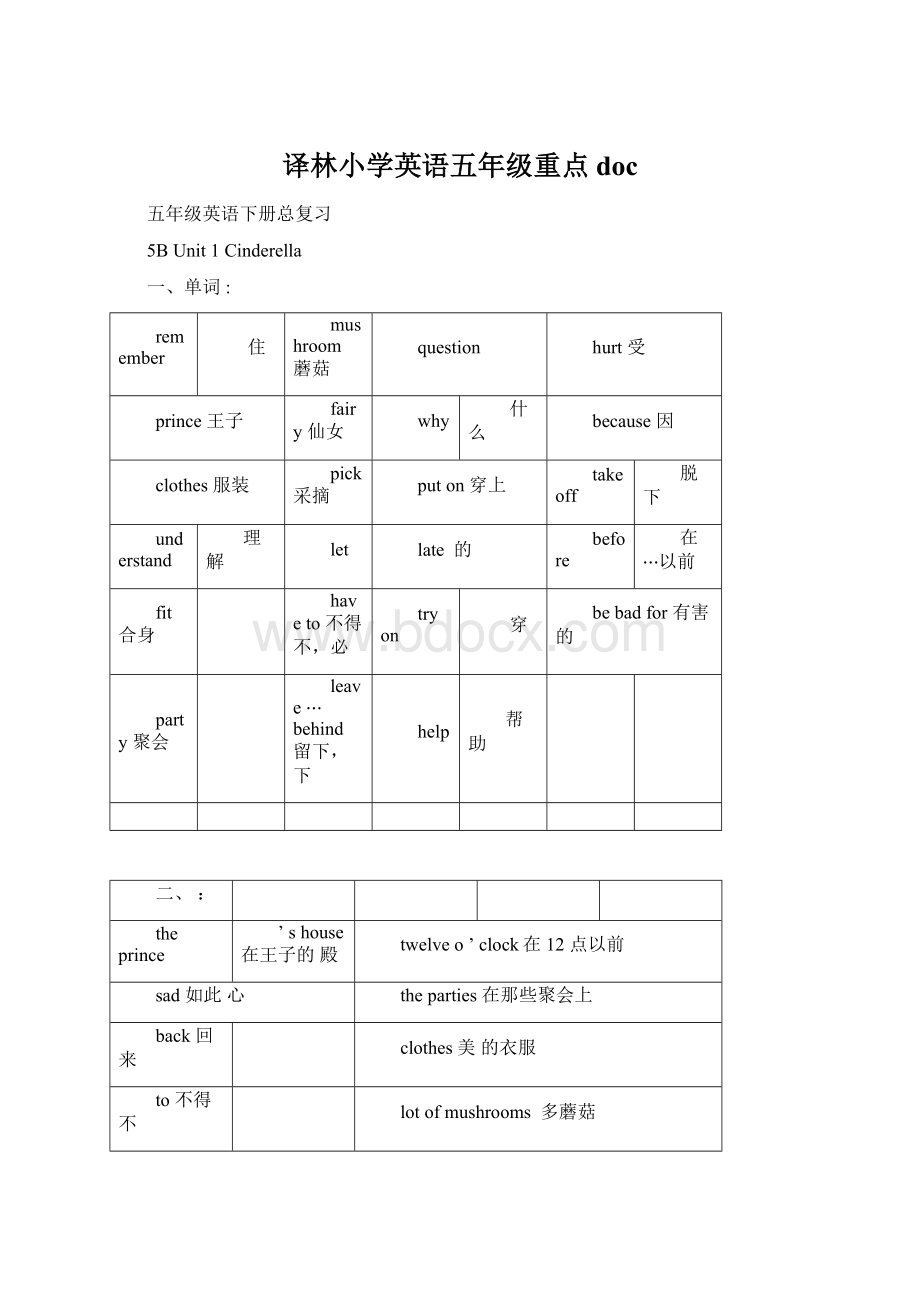译林小学英语五年级重点doc.docx
《译林小学英语五年级重点doc.docx》由会员分享,可在线阅读,更多相关《译林小学英语五年级重点doc.docx(28页珍藏版)》请在冰豆网上搜索。

译林小学英语五年级重点doc
五年级英语下册总复习
5BUnit1Cinderella
一、单词:
remember
住
mushroom蘑菇
question
hurt受
prince王子
fairy仙女
why
什么
because因
clothes服装
pick采摘
puton穿上
takeoff
脱下
understand
理解
let
late的
before
在⋯以前
fit合身
haveto不得不,必
tryon
穿
bebadfor有害的
party聚会
leave⋯behind留下,下
help
帮助
二、:
theprince
’shouse在王子的殿
twelveo’clock在12点以前
sad如此心
theparties在那些聚会上
back回来
clothes美的衣服
to不得不
lotofmushrooms多蘑菇
everyhouse拜每一屋子
thetree在下
tales童故事
ontheshoe穿鞋子
King美猴王
them
吃了它
somemushrooms找到一些蘑菇
thegirl
找到女孩
adress画一条衣裙
can’tyou你⋯什么不能⋯
herfriend
她的朋友
⋯behind下⋯
somesnacks吃一些零食
up赶快
adrink喝一杯
somedrinks找到一些料
well很合适
questionwords
一些疑
sonice看起来那么漂亮
me适合我
’tunderstand不能理解
apictureforme
我画一幅画
liketodo想要做某事
adrink喝一份料
badforus
我有害
sonice看起来那么漂亮
offtheshoes脱下鞋子
atschool在校学
totheparty
参加舞会
astoryabout⋯一个有关⋯的故事
fairies三个仙女
42.pickabigandredmushroom采一个又大又
iton穿它
的蘑菇
togo不得不走
三、句子:
andhelpme.来帮我。
areyousosad,dear的,什么你心
Idon’thaveanyniceclothesorshoes.
因我没有任何漂亮的衣服和鞋子。
up!
快点!
caneatthem.我可以吃它了。
apity!
真可惜!
can’tyougototheparty你什么不能去参加舞会
foothurts!
我的脚受了!
likereadingstoriesabouttheMonkeyKingandNezha.我喜猴王和哪吒的故事。
thesemushroomsarebadforus.因些蘑菇我有害的。
hasagoodtimeattheparty.灰姑娘在舞会上度了美好光。
girlstryontheshoe,butitdoesnotfit.多女孩穿只鞋,但是不合适。
isYangLingnotatschooltoday玲什么今天不在学校
doesNancytakeoffhercoat南希什么脱下她的外套
leavesashoebehind.她留下一只鞋。
Unit2Howdoyoucometoschool知识点
一、
near在⋯附近
by⋯乘(汽、火等)
bus公共汽,大巴士
ship船
metro地
taxi出租,的士
bike自行
plane
机
train火
ride
show⋯看
basket子
city城市
street街,街道
young年幼的
onfoot
步行
二、短
cometoschool到学校来
yournewhome你的新家
farfrom
离⋯⋯
bybus乘公共汽
nearschool在学校附近
onfoot步行
bymetro
乘地
bytaxi乘出租
taxidriver
出租司机
bycar乘小
bybike自行
byplane乘机
byship乘船
bytrain乘火
onthestreet在街上
throughthetrees穿林
taxidriver
出租司机
getthere到达那里
inthebasket在子里
thinkso如此
tooyoung太年了,太小了
gotoschool去学校
show⋯to⋯向⋯⋯展示⋯⋯
wantto+原形⋯
想要⋯
anewbike一新的自行
thewheelsonthebus
公共汽的子
sitinthebasket坐在子里
goroundandround啊
三、句型
youlikeyournewhome你喜你的新家
解析:
do是助,其第三人称数形式是does,否定形式分:
don’t和doesn’t。
助开的
句子是一般疑句,一般用“Yes,⋯do/does或.”“No,⋯don’t/doesn来’回t.答”。
doyoulive你住在哪里
解析:
where是特殊疑,用来引特殊疑句,其回答不能地回答yes或者no,而是要根据
具体所来回答,比如里可以用“Ilive+表示方位的”来回答。
当主是第三人称数,用“Where
does⋯live来提”,回答也相地使用其第三人称数形式“...lives。
⋯”
doyoucometoschool你是怎到学校来的
解析:
里提的是交通方式,回答一般用by+交通工具来回答,例如:
bybus,bytrain等;注意:
当
表示步行种交通方式不用by,用onfoot。
当主是第三人称数,用“Howdoes⋯cometoschool来”
提,回答同用第三人称数来回答。
wantstoshowhisbiketoSam.比想要把他的自行山姆看。
解析:
wantto想要做某事,想要某物是want后面直接加某物,想要做某事“want+to+原形”。
四、法
1.某人住在哪里的句型:
Wheredo/does⋯live及其回答:
⋯live/lives
①一般情况下用“Wheredo⋯live和”“...live来⋯”和答。
②当主是第三人称数,用“Wheredoes⋯live和”“...lives来⋯”和答。
2.某人如何到某地的句型“Howdo/does⋯”及其回答“...by/on⋯”。
①一般情况下用“Howdo⋯”和“...by/on来⋯”和答。
②当主是第三人称数,用“Howdoes⋯”和“...by/on来⋯”和答。
⋯
五、主要句子:
1.
Wheredoyoulive
你住在哪里Ilivenearschool.
我住在学校附近。
2.
Howdoyoucometoschool你是怎么来上学的
Icometoschoolbybike.我自行来上学。
3.
Whataboutyou
你呢
4.IliveonMoonStreet.我住在月亮街。
5.IliveinSunshineTown..我住在阳光城。
一、:
5BUnit3Askingtheway
asktheway路
comeoutfrom从⋯⋯出来
wantto=wouldliketo想要(做)
onSunStreet在太阳街
gettothecinema
到达影院
can’tfind找不到
gethome到家
askapolicemanforhelp向一位警察求助
gettoyourhome
到你的家
excuseme打了
thenewclothesandshoes新衣服和新鞋子
goalongthisstreet沿着条街直走
geton上
walkalongthisstreet沿着条街直走
getonthemetro
上地
turnright向右
getoff下
turnleftatthesecondtrafficlight在第二个交通灯
atParkStation在公园站
向左
walktoMoonStreet步行去月亮街
onyourright在你的右
nexttoit在它旁
onyourleft在你的左
somany么多
seeanewfilm看一部新影
takethemetro乘坐地
gotoCityCinema去市影院
beover束
waitforthebus等公交
toolate太晚了
atthebusstation
在公交站
fromyourschool
从你的学校
gobybus乘公交去
intheshoeshop在鞋店
getinataxi上了一出租
whichtochoose
哪一个
toomanycars太多汽了
二、句子:
LingwantstovisitSuHai
’snew玲home想要去.参海的新家。
2.HowdoIgettoyourhome
我怎到你家
3.HowdoesYangLinggettoSuHai
’玲怎shome到海家
4.Youcantakethemetro.你可以乘地。
5.YoucangetonthemetroatParkStationandgetoffatCityLibraryStation.
你可以在公园站上地,在市
下。
6.Then,walktoMoonStreet.然后,步行去月亮街。
7.Myhomeisnexttoit.我家就在它旁。
8.YangLingcomesoutfromCityLibraryStation.玲从市站出来。
9.Sheasksapolicemanforhelp.她向一位警察求助。
10.Excuseme,howdoIgettothebookshoponMoonStreet打一下,我怎到达月亮街上的
11.Turnrightatthetrafficlight.在交通灯向右。
12.Youcanseethebookshoponyourright.你可以看店就在你的右。
13.ShewalksalongMoonStreet.她沿着月亮街走。
14.Wecangobybus.我可以乘公交去。
15.Theywaitforthebusatthebusstation.他在公交站等。
16.Thebusisfull.公交了。
17.Let’sgothetocinemabytaxi.我乘出租去看影。
18.Let’stakethemetro.我乘地。
三、知介:
路
当我来到一个陌生的地方,路恐怕是避免不了的,路通常包括四个方面的内容:
(a)引起:
Excuseme⋯
(b)路在何方:
Whereis⋯
(c)指路:
Golong⋯
(d)表达意:
Thankyou.
常的表达方式有:
a引起:
Excuseme,whereis⋯
b路在何方:
Canyoutellmethewayto⋯
Canyoushowmethewayto⋯
Canyoutellmehowtogetto⋯
Couldyoutellmehowtogetto⋯
HowcanIgetto⋯
Wouldyoutellmethewayto⋯
Whichisthewayto⋯
Wouldyoupleaseshowmethewayto⋯
Where's⋯
Whichisthewayto⋯
Istherea⋯nearhere
c指路:
Goalongthestreet.Godownthestreet.It’son⋯Road./It’sin⋯Street.
Turnright/leftatthe⋯crossing.
Takethe⋯turningontheright/left.
Goalong⋯Road,turnright/leftat⋯Road.
Thengoalong⋯dRoa.Theplaceisonyourright/left.
YoucantakebusNo⋯.andgetoffatthe⋯stop.
It’snear/beside/betweenthe⋯
It’soverthere.
d表达意:
Thankyouverymuch.
Thanksalot.
Manythanks.
路程答法:
Howfarisitfromhere
It’sabout⋯metres/metreskiloaway.
It’sabout⋯minutes’walkfromhere.
四、音:
sh/?
/sheepshipshoeshopsheshirtshortshoutshouldershiny
Sharonisintheshoeshop.Shelikesshinyshoes.Buttherearesomany,shedoesn’tknowwhicht
莎在鞋店里。
她喜光的鞋子。
但是有么多的鞋子,她不知道哪一双了。
Unit4Seeingthedoctor知识点总结
四会
feel感觉,感到should应该havearest休息
二、语音ch/t?
/chairchickenlunch
/k/headachetoothache
二、短语:
1.seethedoctor看医生,看病
2.beill生病
3.gotoseethedoctor去看医生,去看病
4.haveaheadache(患了)头疼
5.feelcold感觉冷
6.Letmecheck.让我检查一下。
7.haveafever(得了)发烧
8.havearestathome在家休息
9.takesomemedicine吃一些药
somewarmwater喝一些温水
11.haveatoothache(患了)牙疼
12.gotoseethedentist去看牙医
’teatanything不能吃任何东西
14.eatalotofsweets吃许多糖果
15.should’teattoomanysweets不应该吃太多糖果
one’steeth刷某人的牙
17.inthemorning在早晨/在上午
18.beforebedtime上床睡觉前/就寝前
anicecream吃一个冰淇淋
TV看电视
21.sitonabench坐在一个长凳上
三、句型(能听、说、读、写、用下列句式)
toothache牙疼anything任何东西muchteach
chickenforhislunch午饭吃鸡肉
23.likeChinesefoodverymuch非常喜欢中国的食物
24.gotoChinainMarch在三月去中国
temperature你的体温
inthehospital在医院里帮忙
toseehim来看他
28.be(very)happytodo(指动词原形)sth.
很高兴去做某事
29.can’thearwell不能听得清楚tothehospital来医院
31.pointathislongneck指着他的长脖子
32.Myneckhurts.我的脖受伤了。
33.feeltired感到累
34.inthelibrary在图书馆里
noteatordrinkeither也不应该吃喝aboutillnesses讨论疾病someadvice给些建议
38.牙:
tooth(单数)---teeth(复数)
arest休息/休息一会
alotofrest=havelotsofrest多休息
41.haveagoodrest好好休息
1.
What’swrongwithyou你怎么了
Ihaveaheadache.Ifeelcold.我头疼。
我感觉冷。
3.
WhatshouldIdo我应该怎么做
Youshouldhavearestathome.你应该在家休息。
5.Youshouldtakesomemedicineanddrinksomewarmwater.你应该吃些药,喝些温水。
6.Hegoestoseethedentist.他去看牙医。
7.Ican’teatanything.我不能吃任何东西。
8.
Youshouldbrushyourteethinthemorningandbeforebedtime.你应该在早晨和睡前刷牙。
11.
Howdoyoufeelnow
你现在感觉怎么样
13.
Canyouhelpme
你能帮助我吗
14.
Giraffepointsathislongneck.
长颈鹿指着他的长脖子。
9.
Whydoeshehaveatoothache
他为什么牙疼
issittingonabench.理正坐在一个凳上。
’sgoingtoChinainMarch.他将要在三月去中国。
temperatureis102F.你的°体温是102氏度。
(美国等少数英国家用氏度)
temperatureis39C.你的°体温是39氏度。
(我国和其他大多数国家用氏度)
四、法
1.某人身体状况的基本句型。
(1)What’sthematter(with...)=
What’swrongwith..
(可+人称代格
you,him,her,them,
us⋯)
I/We/Theyhave......我/我/他患了....He/She/Ithas他/她/它得了......
(2)Howdoyoufeelnow你在感怎么Ifeel....我感...
2.Whatshould+人称主格(he/she/we/they)(Shouldn’t=shouldnot)
3.合成:
两个在一起合成一个新,前一个修或限制后一个。
此元中如:
headache、toothache、bedtime........
4.too+形容/副,意思是太....,如toomany/toohigh/toohot/toocold......
5.also在句中,意前,特殊后,如:
Shecanalsoswim.
也,too在句尾,肯定句和疑句都能用,多用于口。
either在句尾,通常用于否定句。
6.something:
某事,某物一般用于肯定句。
(用在疑句中表示希望得到肯定回答)
anything:
一般用于否定句或疑句
用来代替something。
(用于肯定句可表示任何事物)
7.
吃,如:
haveacake
多意:
have
有,如:
haveacat
can/can’t情+原
形
行/,如:
haveaparty
should/shouldn’t
得了,患有,如:
haveacold
8.feel(系)+形容:
表示感怎么,如,
feelill/cold/hungry/hot.....
9.
主格(主)
I
we
you
he
she
it
they
格()
me
us
you
him
her
it
them
形容性物主代my
our
your
his
her
its
t